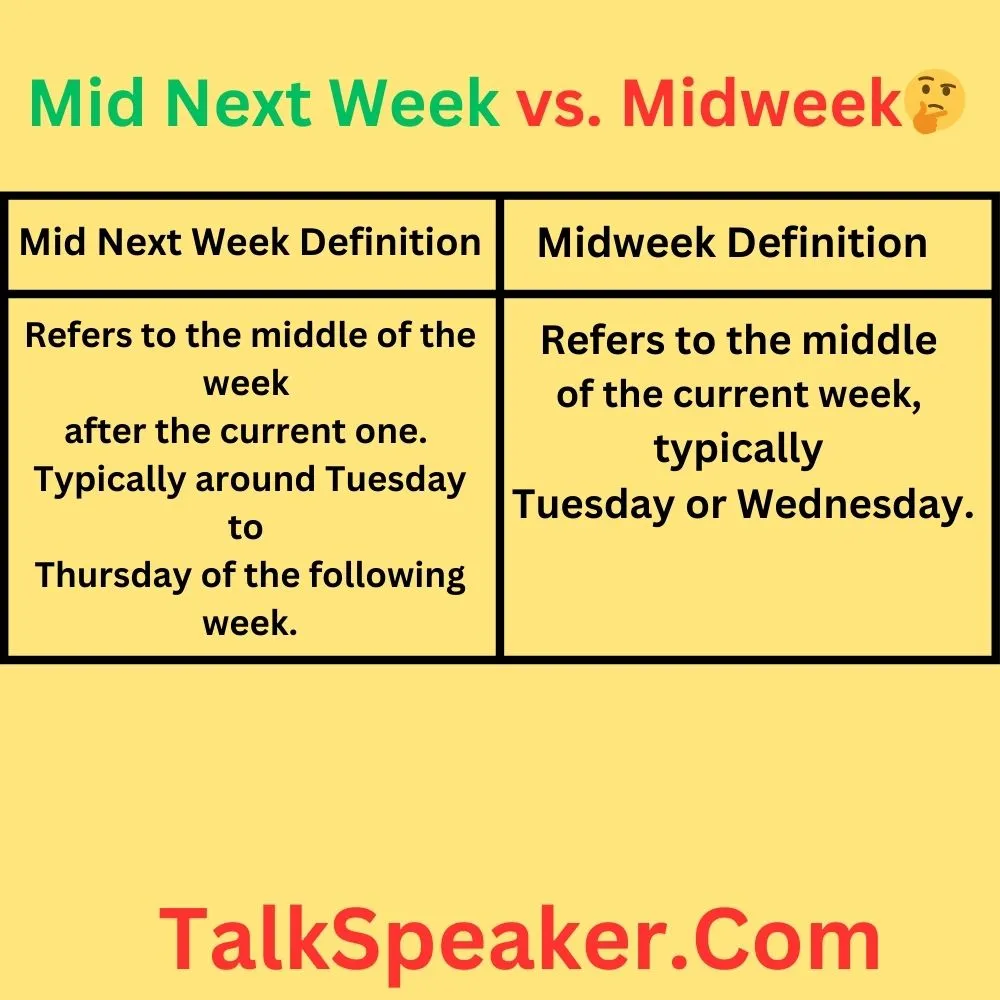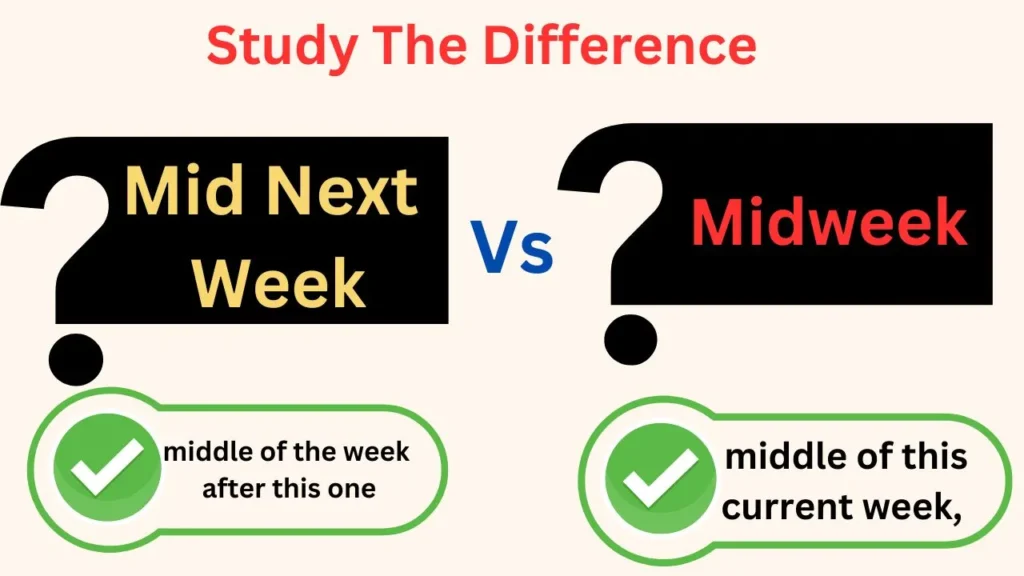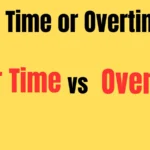Last updated on December 22nd, 2024 at 04:51 am
“Mid next week” means the middle of the week after this one, like next Wednesday or Thursday. “Midweek” means the middle of this current week, usually on Tuesday or Wednesday.
To avoid confusion, it’s best to use specific dates when scheduling meetings or appointments.
When it comes to scheduling and planning, precise communication is crucial. A common point of confusion in everyday conversations is the difference between “mid next week” and “midweek.”
This blog post delves into the definitions, uses, and distinctions between these two phrases, providing clarity and practical tips for effective communication.
Definition and Explanation

Mid Next Week
Mid next week refers to the middle of the week following the current one. If today is Monday, “mid next week” typically means the middle of the week after the upcoming one.
For example, if today is the first Monday of a month, “mid next week” would usually be the middle of the week starting the following Monday.
Usage Examples:
- If you say, “Let’s schedule the meeting for mid next week,” and today is Monday, you’re generally referring to Wednesday or Thursday of the week after the current one.
- In project management, if a task is expected to be completed “mid next week,” it should be understood to be around Wednesday or Thursday of the following week.
Clarification:
When using this term, be aware that it refers to the week after the current one, so it is essential to confirm dates explicitly if there is any ambiguity.
Midweek
Midweek refers to the middle of the current week. It generally covers Tuesday or Wednesday of the week in progress.
This term is straightforward and often used in both professional and personal contexts.
Usage Examples:
- Saying, “Let’s meet midweek,” typically means scheduling the meeting for Tuesday or Wednesday of the present week.
- If you plan to visit a friend midweek, it implies that the visit will happen on Tuesday or Wednesday of that week.
Clarification:
Midweek is always about the present week, so there is less chance of confusion compared to “mid next week.”

Comparative Analysis
Timing
Term Definition Typical Days Mid Next Week Middle of the week after the current one Tuesday to Thursday of the following week Midweek Middle of the current week Tuesday and Wednesday
Mid Next Week:
This term usually covers Tuesday to Thursday of the week that comes after the current one. For instance, if today is Monday, “mid next week” would mean the following Tuesday, Wednesday, or Thursday.
Midweek:
This term specifically points to Tuesday or Wednesday of the current week.
So, if today is Thursday, midweek refers to the past Tuesday or Wednesday, and if today is Monday, it refers to the upcoming Tuesday or Wednesday.
Contextual Usage
In Professional Settings:
- Mid Next Week: In a corporate environment, specifying a deadline or a meeting as “mid next week” helps to plan beyond the current week.
For instance, if a team leader says, “The report is due mid next week,” it means the report is expected by Wednesday or Thursday of the week following the current one. - Midweek: When scheduling meetings or setting deadlines within the same week, “midweek” is a practical term.
For example, a manager saying, “Let’s have a status update midweek,” means Tuesday or Wednesday of the current week.
In Personal Scheduling:
- Mid Next Week: This term can be useful when making plans that require a bit more time. For example, if you are planning a weekend getaway, you might say, “Let’s finalize our plans mid next week,” implying a decision should be made around Wednesday or Thursday of the following week.
- Midweek: For more immediate plans, such as catching up with friends or attending a local event, “midweek” is suitable.
For instance, if you say, “Let’s meet for coffee midweek,” it means you are suggesting a meetup on Tuesday or Wednesday of the current week.
Common Misunderstandings
Misunderstandings often arise when the terms “mid next week” and “midweek” are used interchangeably.
For instance, if someone schedules a call for “mid next week” but then shows up on a day that is midweek of the current week, confusion can occur.
Typical Confusions:
- Project Deadlines: A team might interpret “mid next week” as the middle of the week after the next, leading to potential delays.
- Social Events: Friends might show up on the wrong week if “midweek” is mistakenly understood as “mid next week.”
Impact on Communication:
- Misunderstandings can cause scheduling conflicts, missed deadlines, and general confusion.
Clear communication about dates and times is essential to prevent these issues.
Having trouble with English? We make it simple with easy tips and guides to help you improve.
Start learning and boost your skills Talk Speaker.
Practical Examples
In Workplace Scenarios
Project Deadlines:
Scenario Term Used Expected Date Task Due Mid Next Week Wednesday/Thursday of the following week If today is Monday, the task is due next week Wednesday or Thursday Task Due Midweek Tuesday/Wednesday of the current week If today is Monday, the task is due this week Tuesday or Wednesday
- Example: A project manager states, “The proposal needs to be submitted mid next week.” The team needs to complete the task by Wednesday or Thursday of the following week to meet the deadline.
- Example: If a meeting is scheduled midweek, and today is Friday, it should be set for the next Tuesday or Wednesday.
Meeting Scheduling:
- Mid Next Week: Scheduling a meeting for mid next week ensures it will occur on a date after the current week, often useful for planning far ahead.
- Midweek: Scheduling a midweek meeting typically means arranging it for Tuesday or Wednesday of the current week, providing a shorter notice period.
Tips for Clear Communication
How to Specify Dates Clearly
Using Exact Dates:
- Specify Dates Directly: Instead of using ambiguous terms, provide exact dates. For instance, say “Let’s meet on July 17th” instead of “mid next week.”
- Confirm Dates: When using terms like “mid next week,” clarify by asking, “Do you mean Wednesday or Thursday of next week?”
Confirming Understanding:
- Repeat Dates: Restate the agreed date to ensure both parties are on the same page. For example, “So, we’re meeting next Thursday, correct?”
- Written Confirmation: For important dates, send a follow-up email or message confirming the schedule.
Alternatives to Ambiguous Terms
Specific Phrasing:
- Instead of saying “mid next week,” use “Wednesday, July 17th.”
- Replace “midweek” with “Tuesday, July 16th” or “Wednesday, July 17th.”
Contextual Clarity:
- In Professional Settings: Use specific dates in meetings and deadlines to avoid ambiguity.
- In Personal Life: Confirm dates and times directly to ensure clear understanding.
Curiosity Corner😕
What does “mid next week” mean?
“Mid next week” refers to the middle of the week after the current one. For example, if today is Monday, “mid next week” typically refers to the Wednesday or Thursday of the following week.
What does “midweek” mean?
“Midweek” refers to the middle of the current week, typically Tuesday or Wednesday of the week you are in.
How can I avoid confusion when using “mid next week” and “midweek”?
To avoid confusion, use specific dates instead of phrases like “mid next week” or “midweek.” Always confirm the exact day you’re referring to, especially in professional settings.
What is the difference between “mid next week” and “midweek”?
“Mid next week” means the middle of the next week (not the current one), while “midweek” refers to the middle of the current week.
Both terms usually point to Tuesday, Wednesday, or Thursday, but the time frame differs.
Can “mid next week” and “midweek” be used interchangeably?
No, “mid next week” refers to the middle of the following week, while “midweek” pertains to the current week.
Using them interchangeably can cause scheduling misunderstandings.
Conclusion
Understanding the difference between “mid next week” and “midweek” is essential for effective scheduling and communication.
Mid next week refers to the middle of the week after the current one, usually covering Wednesday to Thursday of the following week. On the other hand, midweek pertains to Tuesday or Wednesday of the current week.
By specifying dates clearly and confirming understanding, you can avoid confusion and ensure smooth planning in both professional and personal contexts. Remember to use precise language and check for mutual agreement to keep your schedules on track.

Sophie Mitchell, a seasoned English educator, brings her passion for language and years of teaching expertise to TalkSpeaker. With a knack for simplifying grammar and expanding vocabulary, she empowers learners to master English with confidence.




